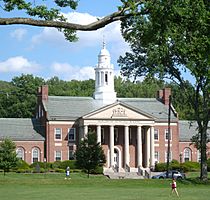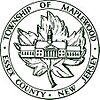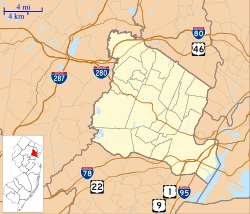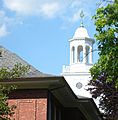Maplewood, New Jersey facts for kids
Quick facts for kids
Maplewood, New Jersey
|
||
|---|---|---|
|
Township
|
||

Municipal Building
|
||
|
||
| Country | ||
| State | ||
| County | Essex | |
| Incorporated | April 1, 1861 as South Orange Township | |
| Renamed | November 7, 1922 as Maplewood township | |
| Government | ||
| • Type | Township | |
| • Body | Township Committee | |
| Area | ||
| • Total | 3.88 sq mi (10.04 km2) | |
| • Land | 3.87 sq mi (10.03 km2) | |
| • Water | <0.01 sq mi (0.01 km2) 0.08% | |
| Area rank | 302nd of 565 in state 11th of 22 in county |
|
| Elevation | 115 ft (35 m) | |
| Population
(2020)
|
||
| • Total | 25,684 | |
| • Estimate
(2023)
|
25,321 | |
| • Rank | 101st of 565 in state 11th of 22 in county |
|
| • Density | 6,629.8/sq mi (2,559.8/km2) | |
| • Density rank | 74th of 565 in state 9th of 22 in county |
|
| Time zone | UTC−05:00 (Eastern (EST)) | |
| • Summer (DST) | UTC−04:00 (Eastern (EDT)) | |
| ZIP Code |
07040
|
|
| Area code(s) | 973 | |
| FIPS code | 3401343800 | |
| GNIS feature ID | 0882220 | |
Maplewood is a township located in Essex County, New Jersey. It is a suburban area close to New York City. Many people who live here travel to New York City for work. In 2020, about 25,684 people lived in Maplewood. This was an increase of over 1,800 people since 2010.
Contents
History of Maplewood
When people first explored the area now known as Maplewood, they found trails used by the Lenape Native American tribes. Not many Native Americans lived here permanently. These old trails are now some of the main roads in Maplewood.
Early European Settlers
The first European settlers arrived around 1675. They were mostly English, Dutch, and French Puritans. They had previously settled in places like Long Island and Connecticut. These settlers bought land from the Native Americans. They followed three main trails, which became South Orange Avenue, Springfield Avenue, and Ridgewood Road. These trails led to the creation of three separate communities. These communities later joined to form Maplewood and South Orange.
One group settled in what became South Orange village. Another group, with families named Smith, Brown, and Pierson, settled along Ridgewood Road. They created farms around a place called Jefferson Village. This area is now downtown Maplewood. It had mills and orchards. The artist Asher Brown Durand was born here in 1796. By 1815, about 30 families lived in Jefferson Village.
A third group settled on a hill near Tuscan and Springfield Avenue. This area was first called North Farms. Later, it became known as the Hilton section. It was a stop for stagecoaches traveling between Newark, Jersey City, and Morristown. This made it a center for trade. In 1855, Seth Boyden, an inventor, moved to this area. He developed new types of berries. He also built the first steam engines for the railroad through Maplewood.
How Maplewood Got Its Name
In 1802, Jefferson Village and North Farms became districts within the Township of Newark. The three communities had their own schools. In 1867, the state of New Jersey created public education. The three school groups merged into one district, which became the South Orange-Maplewood School District.
Maplewood was first called South Orange Township. It was created on April 1, 1861. Parts of it later became South Orange village and Vailsburg. The name of the township officially changed to Maplewood on November 7, 1922.
The name "Maplewood" came from a railroad station. When the Morris and Essex Railroad extended to the area in 1838, a land developer named John Shedden built a station in Jefferson Village. He named it Maplewood. This name then included the areas of Hilton and Jefferson Village. By 1868, farms were divided into lots for homes, and Maplewood became a place where people lived and commuted to work.
Edward Balch (1858–1934) was a homebuilder who helped shape Maplewood. Starting around 1900, he built 176 homes. He is known as the "Father of Maplewood." The 1920s saw a lot of new homes and people moving to the area.
Geography and Climate
Maplewood covers about 3.88 square miles (10.04 square kilometers). Most of this is land. There is a pond in Memorial Park and the Rahway River flows through the township.
Maplewood shares its borders with several other towns. To the north are West Orange and South Orange. To the east are Newark and Irvington. To the south is Union, and to the west is Millburn.
Climate
Maplewood has a climate with hot summers and cold winters. It gets a good amount of rain throughout the year.
| Climate data for Maplewood | |||||||||||||
|---|---|---|---|---|---|---|---|---|---|---|---|---|---|
| Month | Jan | Feb | Mar | Apr | May | Jun | Jul | Aug | Sep | Oct | Nov | Dec | Year |
| Mean daily maximum °F (°C) | 39 (4) |
42 (6) |
51 (11) |
62 (17) |
72 (22) |
81 (27) |
86 (30) |
84 (29) |
77 (25) |
66 (19) |
55 (13) |
44 (7) |
63 (18) |
| Mean daily minimum °F (°C) | 18 (−8) |
20 (−7) |
29 (−2) |
38 (3) |
48 (9) |
57 (14) |
62 (17) |
61 (16) |
53 (12) |
40 (4) |
33 (1) |
24 (−4) |
40 (5) |
| Average precipitation inches (mm) | 4.13 (105) |
3.00 (76) |
4.17 (106) |
4.22 (107) |
4.74 (120) |
4.41 (112) |
4.73 (120) |
4.74 (120) |
5.03 (128) |
4.18 (106) |
4.41 (112) |
3.85 (98) |
51.61 (1,311) |
Population and People
| Historical population | |||
|---|---|---|---|
| Census | Pop. | %± | |
| 1870 | 2,963 | — | |
| 1880 | 1,733 | * | −41.5% |
| 1890 | 1,078 | * | −37.8% |
| 1900 | 1,630 | 51.2% | |
| 1910 | 2,979 | 82.8% | |
| 1920 | 5,283 | 77.3% | |
| 1930 | 21,321 | 303.6% | |
| 1940 | 23,139 | 8.5% | |
| 1950 | 25,201 | 8.9% | |
| 1960 | 23,977 | −4.9% | |
| 1970 | 24,932 | 4.0% | |
| 1980 | 22,950 | −7.9% | |
| 1990 | 21,652 | −5.7% | |
| 2000 | 23,868 | 10.2% | |
| 2010 | 23,867 | 0.0% | |
| 2020 | 25,684 | 7.6% | |
| 2023 (est.) | 25,321 | 6.1% | |
| Population sources: 1870–1920 1870 1880–1890 1890–1910 1910–1930 1940–2000 2000 2010 2020 * = Lost territory in previous decade. |
|||
Maplewood is a diverse community. The population has grown over the years. In 2020, the total population was 25,684.
Population Makeup
The people living in Maplewood come from many different backgrounds.
| Race / Ethnicity (NH = Non-Hispanic) | Pop 1990 | Pop 2000 | Pop 2010 | Pop 2020 | % 1990 | % 2000 | % 2010 | % 2020 |
|---|---|---|---|---|---|---|---|---|
| White alone (NH) | 17,655 | 13,382 | 12,585 | 13,170 | 81.54% | 56.07% | 52.73% | 51.28% |
| Black or African American alone (NH) | 2,516 | 7,644 | 8,189 | 7,740 | 11.62% | 32.03% | 34.31% | 30.14% |
| Native American or Alaska Native alone (NH) | 17 | 25 | 17 | 30 | 0.08% | 0.10% | 0.07% | 0.12% |
| Asian alone (NH) | 649 | 660 | 722 | 951 | 3.00% | 2.77% | 3.03% | 3.70% |
| Pacific Islander alone (NH) | N/A | 6 | 4 | 4 | N/A | 0.03% | 0.02% | 0.02% |
| Some Other Race alone (NH) | 35 | 97 | 110 | 166 | 0.16% | 0.41% | 0.46% | 0.65% |
| Mixed Race or Multi-Racial (NH) | N/A | 806 | 645 | 1,441 | N/A | 3.38% | 2.70% | 5.61% |
| Hispanic or Latino (any race) | 780 | 1,248 | 1,595 | 2,182 | 3.60% | 5.23% | 6.68% | 8.50% |
| Total | 21,652 | 23,868 | 23,867 | 25,684 | 100.00% | 100.00% | 100.00% | 100.00% |
In 2010, about 56% of the population was White, and 35% was Black or African American. About 3% were Asian, and 7% were Hispanic or Latino (who can be of any race). The average household had about 2.89 people.
Arts and Culture in Maplewood
Maplewood is known for its culture and "hip factor." It's often seen as a less typical suburb.
Performance Venues
The township has the Burgdorff Center for the Performing Arts. It used to be a church and was given to the town in 1988. It's a place where different shows and performances happen.
Maplewoodstock Music Festival
Every year, usually in July, Maplewood hosts a free concert called Maplewoodstock. Local and national bands perform. There are also many stalls from local businesses.
Buildings and Parks
Many important buildings and parks in Maplewood were designed by famous architects and landscape artists. The Municipal Building and many schools were designed by Guilbert & Betelle. Memorial Park was designed by the Olmsted Brothers, who also designed parts of Central Park in New York City. Another Olmsted work nearby is South Mountain Reservation. The Maplewood Theater is a historic building where famous shows have been performed.
Parks and Recreation
Maplewood has several parks for outdoor activities.
- Memorial Park is a 25-acre park next to the train station. It was designed in the 1920s and is listed on the National Register of Historic Places.
- Other town parks include Maplecrest Park, DeHart Park, and Milo S. Borden Park.
- To the northwest, Maplewood borders South Mountain Reservation. This is a large 2,100-acre nature reserve that is part of the Essex County Park System.
- The East Branch of the Rahway River flows through the township.
Community Life
Maplewood is known as a diverse and family-friendly place. The downtown area is often called "the village" or "Maplewood Center." Its look hasn't changed much since the 1950s. In 2015, New Jersey Monthly magazine called Maplewood's downtown one of the best. They noted its many shops, art galleries, and restaurants.
Maplewood is also home to a "gayborhood," a neighborhood known for its welcoming LGBTQ+ community. In 2018, Maplewood added permanent rainbow-colored crosswalks to celebrate LGBTQ pride all year round.
Many theater professionals who work on Broadway and off-Broadway shows live in Maplewood. This is because it's easy to travel to Manhattan by train. In 2010, some of these actors and technicians formed their own theater company called Midtown Direct Rep. They named it after the train line they use to commute.
Education
Maplewood is part of the South Orange-Maplewood School District. This district includes schools in both Maplewood and South Orange. The district has one high school, two middle schools, a pre-school, and several elementary schools. In the 2019–20 school year, about 7,353 students were enrolled in the district's 11 schools.
The schools in the district are:
- Montrose Early Childhood Center (Pre-K; Maplewood)
- Seth Boyden Elementary Demonstration School (K–5; Maplewood)
- Clinton Elementary School (K–5; Maplewood)
- Jefferson Elementary School (3–5; Maplewood)
- Marshall Elementary School (K–2; South Orange)
- South Mountain Elementary School (K–5; South Orange)
- South Mountain Elementary School Annex (K–1; South Orange)
- Tuscan Elementary School (K–5; Maplewood)
- Maplewood Middle School (6–8; Maplewood)
- South Orange Middle School (6–8; South Orange)
- Columbia High School (9–12; Maplewood)
Transportation
Maplewood has a good transportation system, making it easy to get around.
Roads and Highways
As of 2010, Maplewood had about 59 miles of roads. Most of these are maintained by the town. Route 124 (Springfield Avenue) is a state highway. Several other main roads are county roads.
Public Transportation
NJ Transit provides train service from Maplewood station. You can take trains on the Morristown Line and Gladstone Branch to places like Newark Broad Street Station and New York Penn Station. You can also connect to Hoboken Terminal.
NJ Transit also offers bus service to Newark and the Port Authority Bus Terminal in Midtown Manhattan. Maplewood also has its own "Jitney" service during rush hour to help people get to and from the train station.
Notable People from Maplewood
Many interesting people have lived in or are connected to Maplewood. Here are a few:
- Jason Alexander (born 1959), actor, famous for playing George Costanza on Seinfeld.
- Ahmed Best (born 1973), voice actor who played Jar Jar Binks in the Star Wars movies.
- Seth Boyden (1788–1870), an important inventor.
- Zach Braff (born 1975), actor, known for Scrubs and the movie Garden State.
- Marques Brownlee (born 1993), a popular YouTube personality known as 'MKBHD'.
- Asher Brown Durand (1796–1886), a famous painter.
- Ibtihaj Muhammad (born 1985), a fencer who was the first Muslim woman to wear a hijab while competing for the U.S. team at the 2016 Summer Olympics.
- Theodore Roosevelt (1858–1919), a former U.S. President, spent summers in Maplewood visiting his uncle.
- SZA (born 1989), a popular Neo Soul / R&B music artist.
- Teresa Wright (1918–2005), an actress.
Images for kids
-
Riders waiting for a train at Maplewood station bound for New York City during the morning rush hour
See also
 In Spanish: Maplewood (Nueva Jersey) para niños
In Spanish: Maplewood (Nueva Jersey) para niños
 | Georgia Louise Harris Brown |
 | Julian Abele |
 | Norma Merrick Sklarek |
 | William Sidney Pittman |












